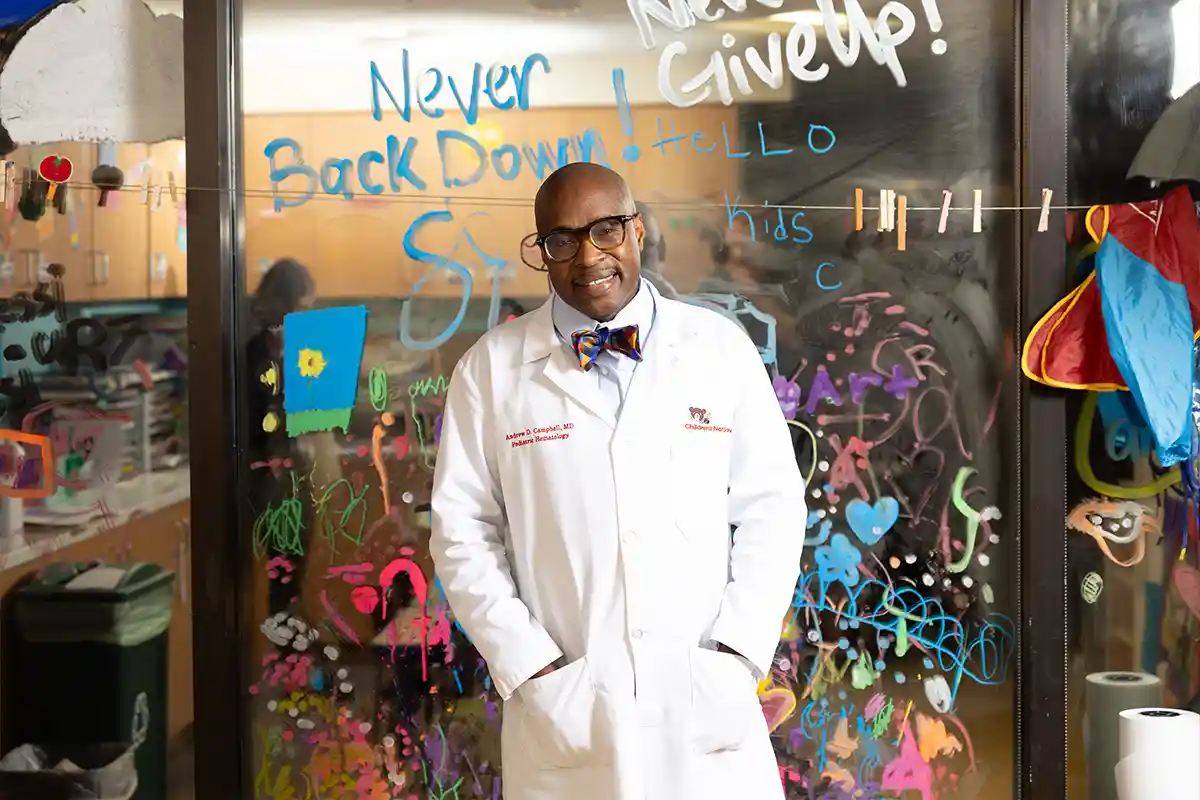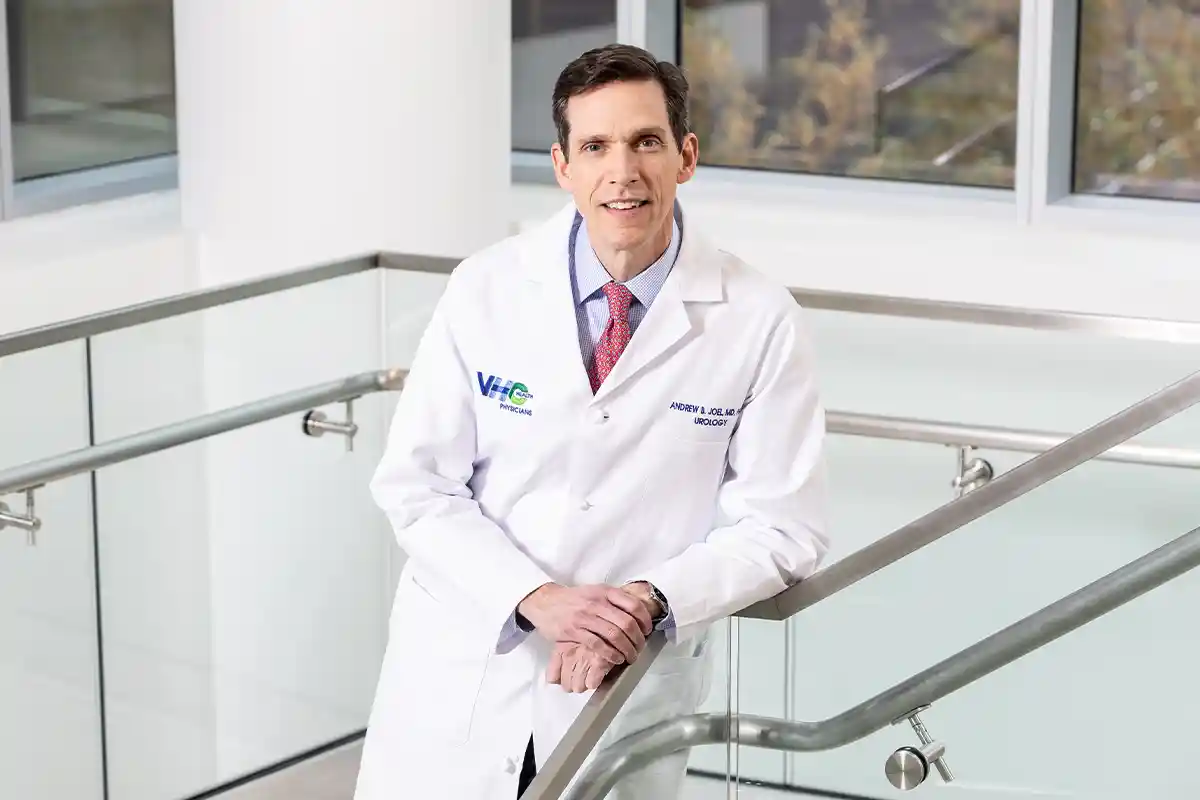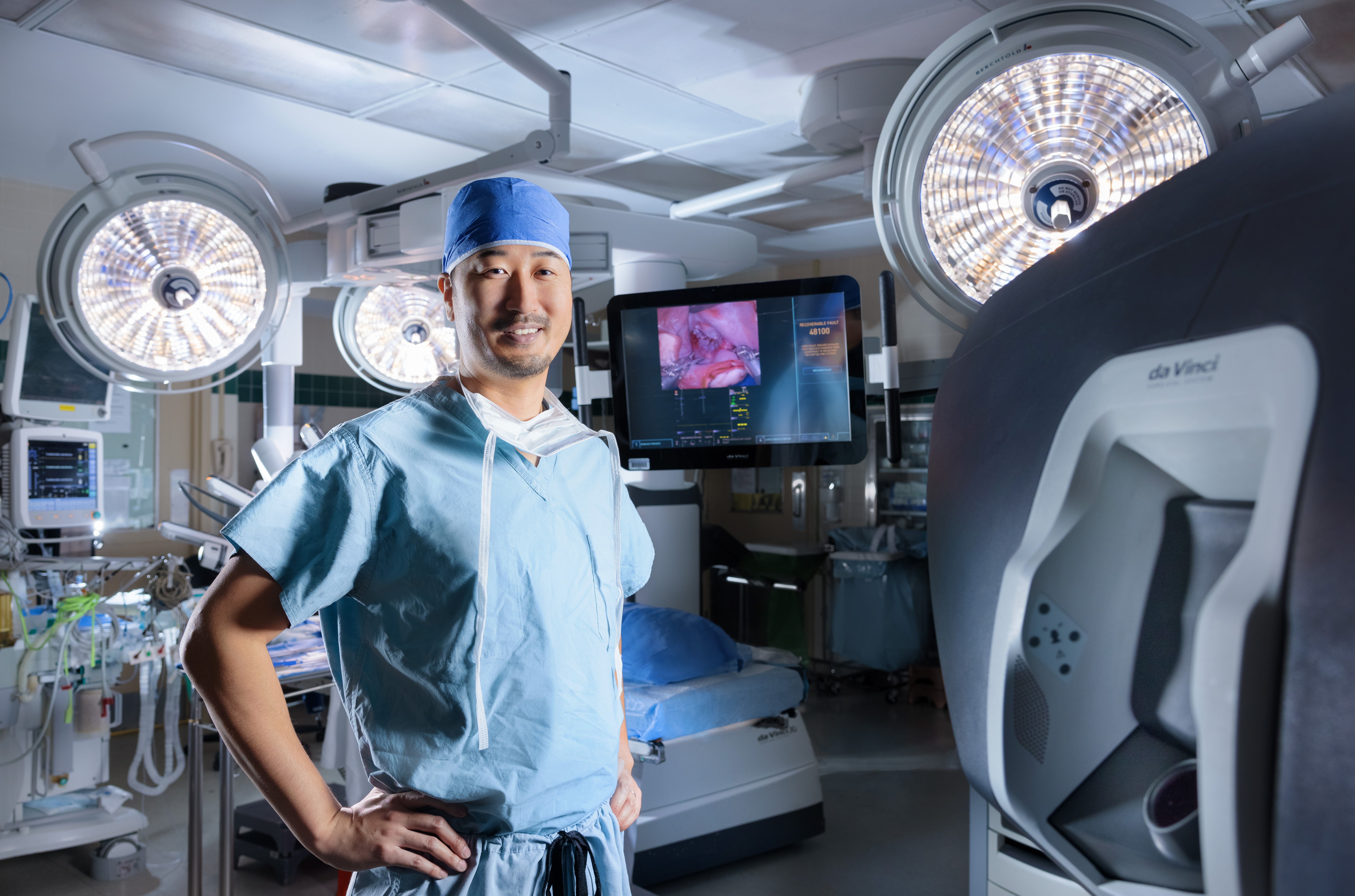Behind the Stethoscope: Stories and Insights from Northern Virginia and DC’s Top Doctors

Discover the dedicated professionals behind your appointments and surgeries. These five exceptional doctors, featured in our 2025 Top Doctors list, open up about their career paths, groundbreaking advancements, and memorable experiences in their respective fields.
Dr. Andrew Campbell

Empty heading
Pediatric Hematology/Oncology
Children’s National
20 years in practice
Why did you choose your specialty?
A pediatric rotation in medical school changed my life. I cared for a young patient with sickle cell disease in severe pain, and sadly, they passed away. That experience left a mark on me and inspired my dedication to advancing treatment options for such patients, especially given the lack of FDA-approved therapies at that time.
What advances have you seen in your field?
The development of gene therapy for sickle cell disease marks a significant breakthrough. Approved by the FDA in December 2023, it’s the most revolutionary treatment since the disease’s discovery in 1910.
Memorable patient story
Early in my career, I treated a young girl with severe sickle cell disease. She underwent a bone marrow transplant thanks to a 100% HLA-matched donor and saw life-changing results. Years later, I reconnected with her—healthy, pain-free, and thriving. Witnessing her graduate college and live a fulfilling life confirmed the incredible potential of advancements in our field.
Dr. Leah Kroeger

Neurology
UVA Health
18 years in practice
Why did you choose neurology?
I love how neurology bridges patient care across all age groups and conditions. It’s like solving a puzzle—careful history-taking and physical exams often lead to precise diagnoses and treatment strategies.
Advancements in neurology
Treatment options for multiple sclerosis and migraines have significantly expanded. For instance, CGRP antagonists now provide effective migraine prevention and relief. Epilepsy treatments have also improved with numerous new medications introduced.
Challenges in neurology
It’s difficult when no specific treatments or cures exist for conditions. However, my goal is always to provide symptom relief and instill hope in my patients.
What’s fulfilling about your work?
Building meaningful relationships with my patients during some of life’s toughest battles. Offering reassurance and hope amidst uncertainty is incredibly rewarding.
Dr. Andrew Joel

Urology
VHC Health
21 years in practice
Why did you choose urology?
Urology offers an exciting mix of surgical and clinical care. With cutting-edge technology like robotics and lasers constantly advancing, the field stays dynamic and engaging.
Memorable patient story
I’ve had patients express gratitude in unique ways—like letters, homemade raspberry jam, or even information about a shared passion for history. These kind gestures remind me of the incredible humanity in caregiving.
Healthy habit
I make fruits, vegetables, and whole grains a part of my daily diet.
Advice for aspiring doctors
Take some time off between college and med school to explore what it really means to be a doctor. It’s a rewarding career but demands commitment. Entering with clarity of purpose makes all the difference.
Dr. Yuji Kawano

Cardiac Surgery
MedStar Washington Hospital Center
8 years in practice
Why focus on robotic cardiac surgery?
Robotic surgery combines technology and precision, making it the least invasive and most innovative approach in cardiac care today. It’s a privilege to help patients while advancing healthcare through innovation.
Advances in cardiac surgery
Techniques like TAVR (transcatheter aortic valve replacement) have transformed cardiac care, offering minimally invasive alternatives to open-heart surgery. Robotic surgery takes this further—enabling quicker recovery, reduced pain, and better outcomes through precise procedures.
Most fulfilling part of your work
Helping patients with heart disease return to normal, healthy lives. Fixing such a vital organ never ceases to be rewarding.
Healthy habit
I stay active by playing basketball weekly.
Dr. Eleanor Wilson

Podiatry
Mid-Atlantic Permanente Medical Group
31 years in practice
Why did you choose podiatry?
As a college athlete, I suffered from a foot condition that only a podiatrist could diagnose and treat. That life-changing care inspired me to explore the field and pursue it as a career.
What have you learned in practice?
Foot pain doesn’t just affect physical health—it can impact mental well-being. My approach targets the root cause of the issue, ensuring that my patients feel truly heard and cared for.
Important patient advice
The shoes you wear and your weight greatly influence foot and overall health.
How do you de-stress?
Unwinding with a walk with my husband and our dog, Kona, is my go-to. We have some of our best conversations this way.
Dr. Felasfa M. Wodajo

Orthopedic Surgery
Virginia Cancer Specialists
22 years in practice
Orthopedic oncology found me, rather than the other way around. During my residency, my co-residents insisted I’d enjoy this specialty. Despite my initial doubts, they were right. After my rotation, I realized they saw what I couldn’t see in myself—I was passionate about it.
Lessons from Practice
The learning never stops. I’ve witnessed the unique ways families cope with adversity and how patients value honesty even in difficult conversations. I’ve seen children resiliently face challenges while their parents reach the limits of their strength. I’ve learned that patients will always remember the support they received during their toughest moments. And most importantly, I’ve learned that kindness—no matter how small—goes a long way.
Future of Orthopedic Oncology
The field is becoming increasingly interdisciplinary, integrating trauma surgery and interventional radiology. Bone reconstruction is advancing rapidly with precision 3D-printed implants, allowing greater functionality post-surgery. We’re also on the verge of leveraging AI to refine radiologic and pathologic evaluations.
A Patient Story
A father once reminded me of a conversation with his daughter during her cancer diagnosis. She’d asked me if her cancer would kill her. I couldn’t remember the moment, but he said I told her, “Not if I have anything to do with it.” That response, neither a yes nor a no, gave her hope—exactly what she needed. It reminded me how impactful words can be in moments of vulnerability.
How I De-stress
I unwind by listening to audiobooks while walking. But when time allows, there’s nothing like riding my motorcycle on scenic roads or doing laps at a racetrack to refocus and decompress.
Dr. Frank Ciampi

Family Medicine
Sentara
40 years in practice
Growing up, I saw my father, a family physician, dedicate himself to his patients in Newark, NJ. Witnessing his compassion and commitment planted the seed that grew into my own medical career.
The Challenges of Family Medicine
Family medicine is demanding—it requires staying updated on both medical advances and the emotional needs of patients. The biggest challenge? Maintaining this level of dedication within the constraints of a busy schedule.
What Patients Should Know
The best results happen when the doctor-patient relationship is a partnership. I see myself as a coach, guiding my patients. Ultimately, every decision is theirs to make, and trust is the foundation of that relationship.
Most Fulfilling Part of the Job
Helping others is deeply rewarding. It may sound cliché, but I believe giving back is the key to happiness.
Healthy Habits I Follow
I stick to a Mediterranean diet and dedicate time daily to structured exercise.
An Inspiring Figure
My father was my hero and the inspiration behind my dedication to family medicine.
Dr. James Ecklund

Neurosurgery
Inova
32 years in practice
Why Neurosurgery?
Growing up with a brother who had a severe mental disability sparked a deep desire to “fix the brain.” My admiration for neurosurgeons—who embody grit, focus, and courage—cemented my path. To me, the brain is the final frontier in medicine, full of untapped possibilities.
How the Military Shaped Me
Serving in the military showed me the parallels between healthcare and defending our nation, both deeply rooted in service. Operating in combat zones honed my creativity and adaptability, traits I continue to draw on when facing unexpected challenges in the OR.
Advances in the Field
Surgical techniques are now more precise, thanks to innovations such as stereotactic guidance, robotics, and minimally invasive methods. Technologies like deep brain stimulation and brain-computer interfaces hold great promise for improving patients’ lives.
Dr. Rod Flynn

Surgery
Mary Washington Healthcare
20 years in practice
A Memorable Patient Story
I treated a young woman with advanced breast cancer during her pregnancy. It was unthinkable for her to go through a mastectomy while carrying a child, but thanks to a collaborative and compassionate team, both mother and baby thrived. One of my favorite memories is being paged to her delivery room to witness the birth of her child—a vivid reminder of hope through adversity.
How I Put Patients at Ease
I meet my patients where they are emotionally, focusing on being a person first and a doctor second. Knowledge is power, so I ensure every patient fully understands their options, especially with a complex diagnosis like cancer. Treating my patients as I would my own family fosters trust and reassurance during difficult times.
Dr. Jeffrey Lin

Gynecologic Oncology
Johns Hopkins
33 years in practice
Recent Advances in Gynecologic Oncology
Decades of progress in chemotherapy, minimally invasive surgery, and advanced tumor resection techniques have transformed care. Today, targeted therapies like immunotherapy offer better outcomes and improved quality of life for many patients.
A Patient Story
One patient with advanced ovarian cancer once faced what seemed like insurmountable odds. After extensive surgery and six weeks in the hospital, she managed to fight back, watching her daughter grow up, marry, and even have her grandchild. She continues to inspire me to this day.
What I’ve Learned
Every patient offers a new lesson if you remain observant and humble.
Most Fulfilling Aspect of My Job
Developing deep, enduring relationships with patients over the years and seeing the milestones they achieve thanks to our work together.
Dr. Adam Friedman

Dermatology
GW Medical Faculty Associates
15 years in practice
What’s most fulfilling about your work?
Being a physician allows me the privilege of educating and empowering patients by giving them clear, easy-to-understand explanations of their medical concerns and the steps we can take to address them. As a clinical educator, I have the honor of preparing the next generation of dermatologists by teaching residents and students about research methodologies and clinical dermatology. On a larger scale, I also find immense satisfaction in sharing knowledge at national and international conferences. Facilitating discussions on groundbreaking innovations and lessons from my own career is incredibly rewarding.
What’s the most challenging part of your field?
One of the biggest challenges dermatologists and their patients face is access to care and medications. Many of the treatments we prescribe, particularly systemic medications like pills or injections for chronic inflammatory skin conditions, require extensive administrative work and negotiations to ensure patients receive the therapies they need.
What’s one healthy habit you practice?
Being a dermatologist, my go-to habit is applying sunscreen daily to all exposed areas. An added bonus? Use a moisturizer with sunscreen (SPF 30 or higher, broad-spectrum) on damp skin to lock in much-needed hydration. This helps maintain proper skin turnover, exfoliation, and overall skin functionality.
Was there a doctor who inspired you?
Definitely! My father was my greatest inspiration. He was the spark that ignited my passion for medicine, research, and teaching. His unwavering dedication continues to influence my own enthusiastic approach to the field.
